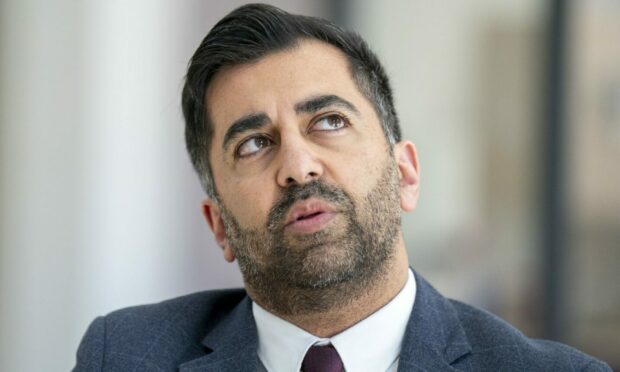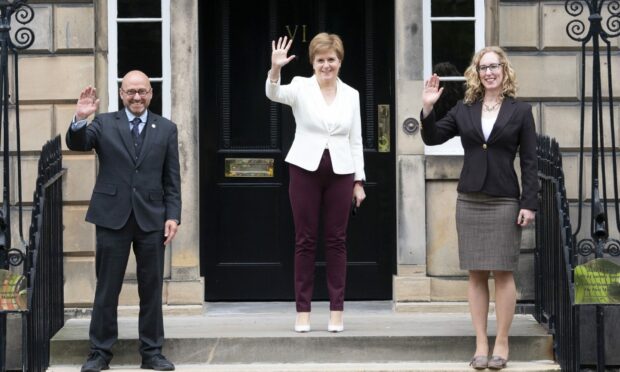If you want to know how Humza Yousaf is being advised, you don’t need to look further than Kevin Pringle’s back catalogue of Courier columns.
Over the course of a year, the man who used to spin for Alex Salmond aired his views on topics which continue to pose problems for the SNP.
Now, eight years after quitting the party’s media operation, he is back in the fold to advise Mr Yousaf through choppy waters.
Here are some of Mr Pringle’s thoughts on the big problems.
The Green party deal
The SNP-Green deal was struck by former first minister Nicola Sturgeon but has been under strain.
Polls suggest it is still supported by most party voters, but splits emerged over energy policy, road building and gender reform.
The Greens are seen by some, including veteran SNP MSP Fergus Ewing, as a block on party pledges like dualling the A9 Perth-Inverness road.
Mr Yousaf backs the SNP-Green co-operation deal, known as the Bute House Agreement.
READ MORE: Kevin Pringle on the SNP-Green deal
“In my view, the SNP is overvaluing having an inbuilt majority at Holyrood in this parliament – courtesy of the seven Green members – because of feeling an acute sense of insecurity as a minority administration in the last parliament,” Mr Pringle wrote this year.
“I was supportive of the SNP doing a deal with the Greens in 2021, and on balance remain so.
“But I don’t think it should be regarded as an absolute.
“The Bute House Agreement wasn’t carved on tablets of stone.”
Transgender policy
Gender reform may have played its part in Ms Sturgeon’s decision to quit in the new year.
The argument about self-ID as a way to declare gender has been a major source of political tension.
Mr Yousaf has backed the reforms which accept “transwomen are women”.
But Mr Pringle urged caution after a shocking court case this year brought the policy to even wider attention.
“I don’t, for example, hold with the blanket assertion that transwomen are women, which reflects ideology rather than biology,” he wrote.
“It is inescapable that this doctrine played a role in Isla Bryson (formerly Adam Graham), who was convicted of two rapes before identifying as a woman, initially being remanded to Cornton Vale women’s prison.
“That should never have happened.
“I would say that transwomen are transwomen, and as such have an equal right to a good life and the support of society.”
Working with Labour
Mr Pringle can see a future where the SNP and Labour dominate Holyrood together, presumably to lock out Conservatives.
“Recent polls suggest that while the SNP will still be the biggest party at the next Holyrood election in 2026, there might not be a pro-independence majority,” he wrote.
“A deal with the Greens would be null and void.
“In these circumstances, my preference would for a supermajority of SNP and Labour MSPs.
“Such an agreement may seem unlikely at present, but stranger things have happened.”
READ MORE: Labour could be safe harbour
Mr Pringle also has practical reasons for accepting a Labour government under Sir Keir Starmer.
“A better governed England, ideally moving towards closer alignment with Europe’s single market, will best serve the interests of a future independent Scotland,” he adds.
Scottish independence
The SNP election campaign in February and March was dominated by exchanges over failures to achieve a second referendum on independence.
Mr Pringle says the most important thing is it takes place over the course of this parliamentary term.
“I believe that will be the case,” he claimed recently.
But he accepts the push will be an “endurance test”.
LISTEN: The Stooshie politics podcasts
Policy headaches…
To get to a referendum, Mr Pringle has reflected on the SNP’s mantra of competence in government.
That means he has his work cut out to sort domestic policy problems, the recovery from the Covid crisis, a stretched NHS and multiple infrastructure headaches.
Last week, Mr Pringle saw the potential for independence support through the row over the deposit return scheme.
He speculated that UK interference in devolved responsibilities will backfire for unionists.
“Instead of 10 green bottles, it could be case for the union that accidentally falls,” he claimed.
He accepts the party is having trouble, but claims they’re not as bad as the alternative.
“What I still don’t see on the opposition benches is an alternative government,” he writes.
KEVIN PRINGLE: Humza Yousaf must listen to both sides of SNP’s 52-48% voter split
Mr Pringle already offered some free advice to Mr Yousaf on rebuilding trust after the fractious SNP leadership vote.
He points out the defeated candidates, Ash Regan and Kate Forbes, advocated major change. The majority of people who voted back the two runners-up.
That could indicate scepticism over gender legislation and the Greens deal.
“The first minister has a clear mandate, but he doesn’t have a free hand to act unilaterally,” Mr Pringle wrote.




Conversation